Entrepreneurial Ventures and Small Business Impact on UK Economy
VerifiedAdded on 2022/12/15
|16
|4145
|485
Report
AI Summary
This report delves into the realm of small business entrepreneurship, meticulously examining the various types of entrepreneurial ventures, including micro, small, medium, and large enterprises. It explores their characteristics, similarities, and differences, providing a comprehensive typology. The report highlights the significant impact of small and micro businesses on the UK economy, emphasizing their contribution to job creation, innovation, and economic growth. It also discusses the importance of small businesses in driving innovation, meeting social purposes, and fostering diversity. The report offers an in-depth analysis of the role of small businesses in generating turnover and contributing to the overall growth of the UK economy, providing valuable insights into the dynamics of entrepreneurship and its influence on national prosperity.

SMALL BUSINESS
ENTREPRENURSHIP
ENTREPRENURSHIP
Paraphrase This Document
Need a fresh take? Get an instant paraphrase of this document with our AI Paraphraser
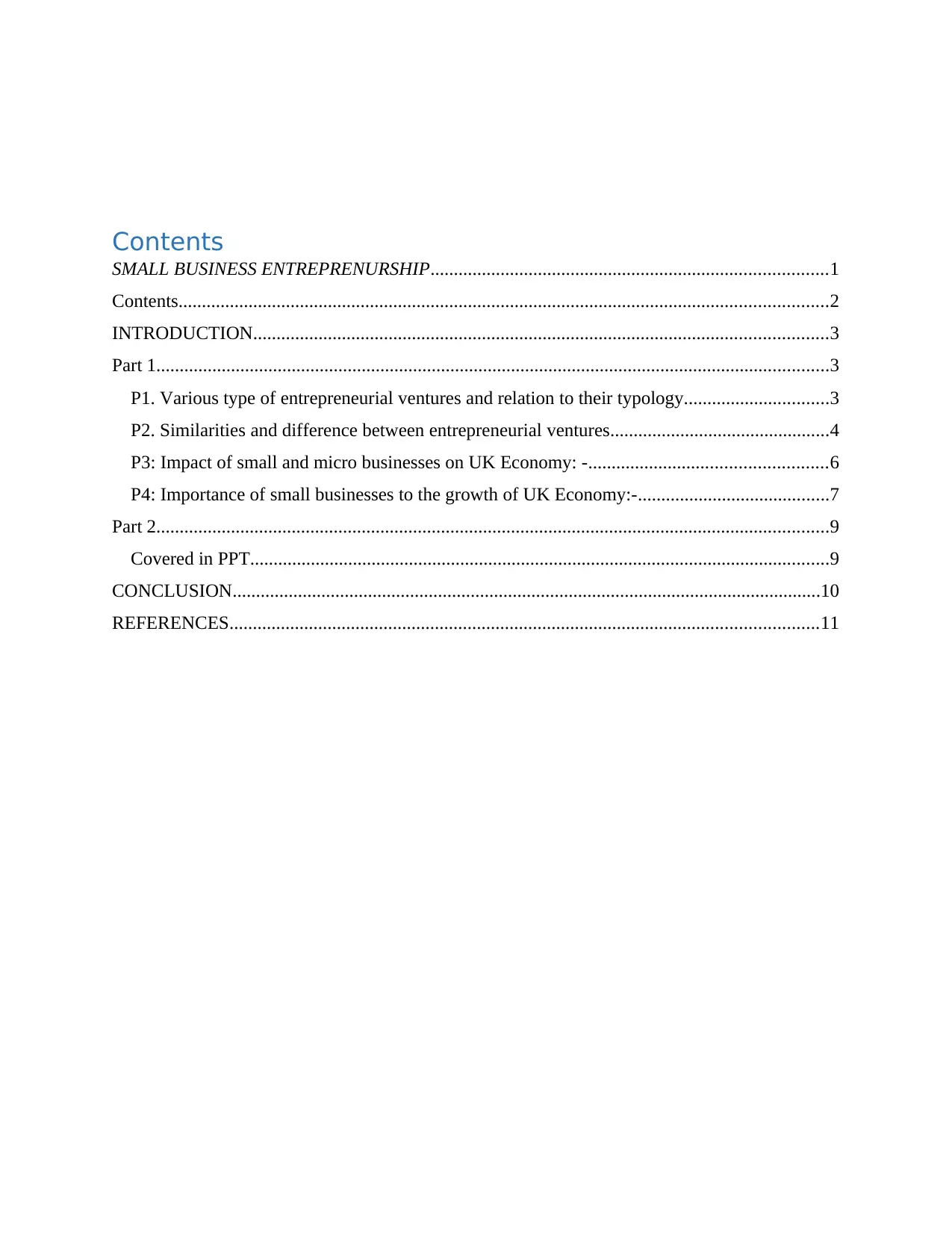
Contents
SMALL BUSINESS ENTREPRENURSHIP.....................................................................................1
Contents...........................................................................................................................................2
INTRODUCTION...........................................................................................................................3
Part 1................................................................................................................................................3
P1. Various type of entrepreneurial ventures and relation to their typology...............................3
P2. Similarities and difference between entrepreneurial ventures...............................................4
P3: Impact of small and micro businesses on UK Economy: -...................................................6
P4: Importance of small businesses to the growth of UK Economy:-.........................................7
Part 2................................................................................................................................................9
Covered in PPT............................................................................................................................9
CONCLUSION..............................................................................................................................10
REFERENCES..............................................................................................................................11
SMALL BUSINESS ENTREPRENURSHIP.....................................................................................1
Contents...........................................................................................................................................2
INTRODUCTION...........................................................................................................................3
Part 1................................................................................................................................................3
P1. Various type of entrepreneurial ventures and relation to their typology...............................3
P2. Similarities and difference between entrepreneurial ventures...............................................4
P3: Impact of small and micro businesses on UK Economy: -...................................................6
P4: Importance of small businesses to the growth of UK Economy:-.........................................7
Part 2................................................................................................................................................9
Covered in PPT............................................................................................................................9
CONCLUSION..............................................................................................................................10
REFERENCES..............................................................................................................................11
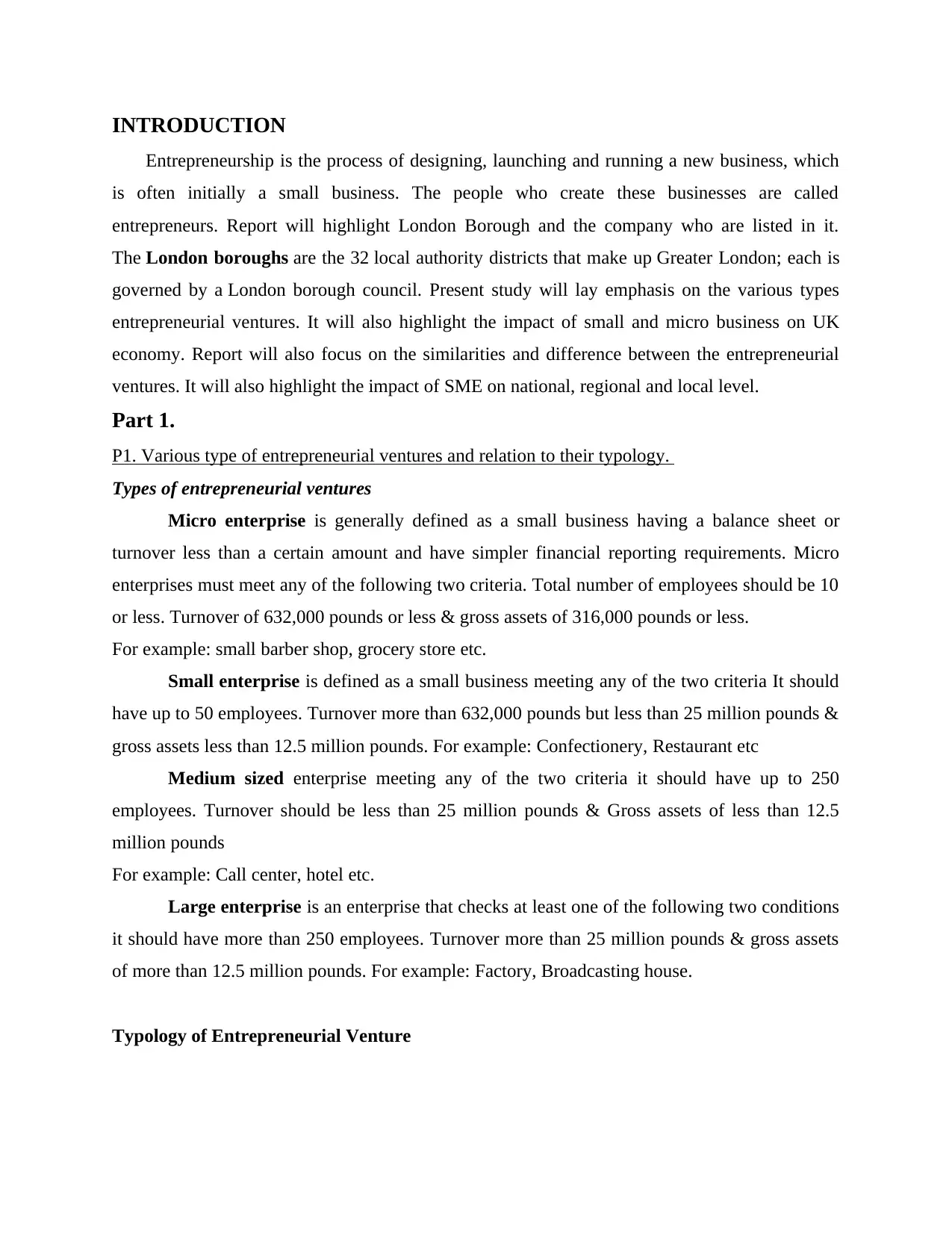
INTRODUCTION
Entrepreneurship is the process of designing, launching and running a new business, which
is often initially a small business. The people who create these businesses are called
entrepreneurs. Report will highlight London Borough and the company who are listed in it.
The London boroughs are the 32 local authority districts that make up Greater London; each is
governed by a London borough council. Present study will lay emphasis on the various types
entrepreneurial ventures. It will also highlight the impact of small and micro business on UK
economy. Report will also focus on the similarities and difference between the entrepreneurial
ventures. It will also highlight the impact of SME on national, regional and local level.
Part 1.
P1. Various type of entrepreneurial ventures and relation to their typology.
Types of entrepreneurial ventures
Micro enterprise is generally defined as a small business having a balance sheet or
turnover less than a certain amount and have simpler financial reporting requirements. Micro
enterprises must meet any of the following two criteria. Total number of employees should be 10
or less. Turnover of 632,000 pounds or less & gross assets of 316,000 pounds or less.
For example: small barber shop, grocery store etc.
Small enterprise is defined as a small business meeting any of the two criteria It should
have up to 50 employees. Turnover more than 632,000 pounds but less than 25 million pounds &
gross assets less than 12.5 million pounds. For example: Confectionery, Restaurant etc
Medium sized enterprise meeting any of the two criteria it should have up to 250
employees. Turnover should be less than 25 million pounds & Gross assets of less than 12.5
million pounds
For example: Call center, hotel etc.
Large enterprise is an enterprise that checks at least one of the following two conditions
it should have more than 250 employees. Turnover more than 25 million pounds & gross assets
of more than 12.5 million pounds. For example: Factory, Broadcasting house.
Typology of Entrepreneurial Venture
Entrepreneurship is the process of designing, launching and running a new business, which
is often initially a small business. The people who create these businesses are called
entrepreneurs. Report will highlight London Borough and the company who are listed in it.
The London boroughs are the 32 local authority districts that make up Greater London; each is
governed by a London borough council. Present study will lay emphasis on the various types
entrepreneurial ventures. It will also highlight the impact of small and micro business on UK
economy. Report will also focus on the similarities and difference between the entrepreneurial
ventures. It will also highlight the impact of SME on national, regional and local level.
Part 1.
P1. Various type of entrepreneurial ventures and relation to their typology.
Types of entrepreneurial ventures
Micro enterprise is generally defined as a small business having a balance sheet or
turnover less than a certain amount and have simpler financial reporting requirements. Micro
enterprises must meet any of the following two criteria. Total number of employees should be 10
or less. Turnover of 632,000 pounds or less & gross assets of 316,000 pounds or less.
For example: small barber shop, grocery store etc.
Small enterprise is defined as a small business meeting any of the two criteria It should
have up to 50 employees. Turnover more than 632,000 pounds but less than 25 million pounds &
gross assets less than 12.5 million pounds. For example: Confectionery, Restaurant etc
Medium sized enterprise meeting any of the two criteria it should have up to 250
employees. Turnover should be less than 25 million pounds & Gross assets of less than 12.5
million pounds
For example: Call center, hotel etc.
Large enterprise is an enterprise that checks at least one of the following two conditions
it should have more than 250 employees. Turnover more than 25 million pounds & gross assets
of more than 12.5 million pounds. For example: Factory, Broadcasting house.
Typology of Entrepreneurial Venture
⊘ This is a preview!⊘
Do you want full access?
Subscribe today to unlock all pages.

Trusted by 1+ million students worldwide
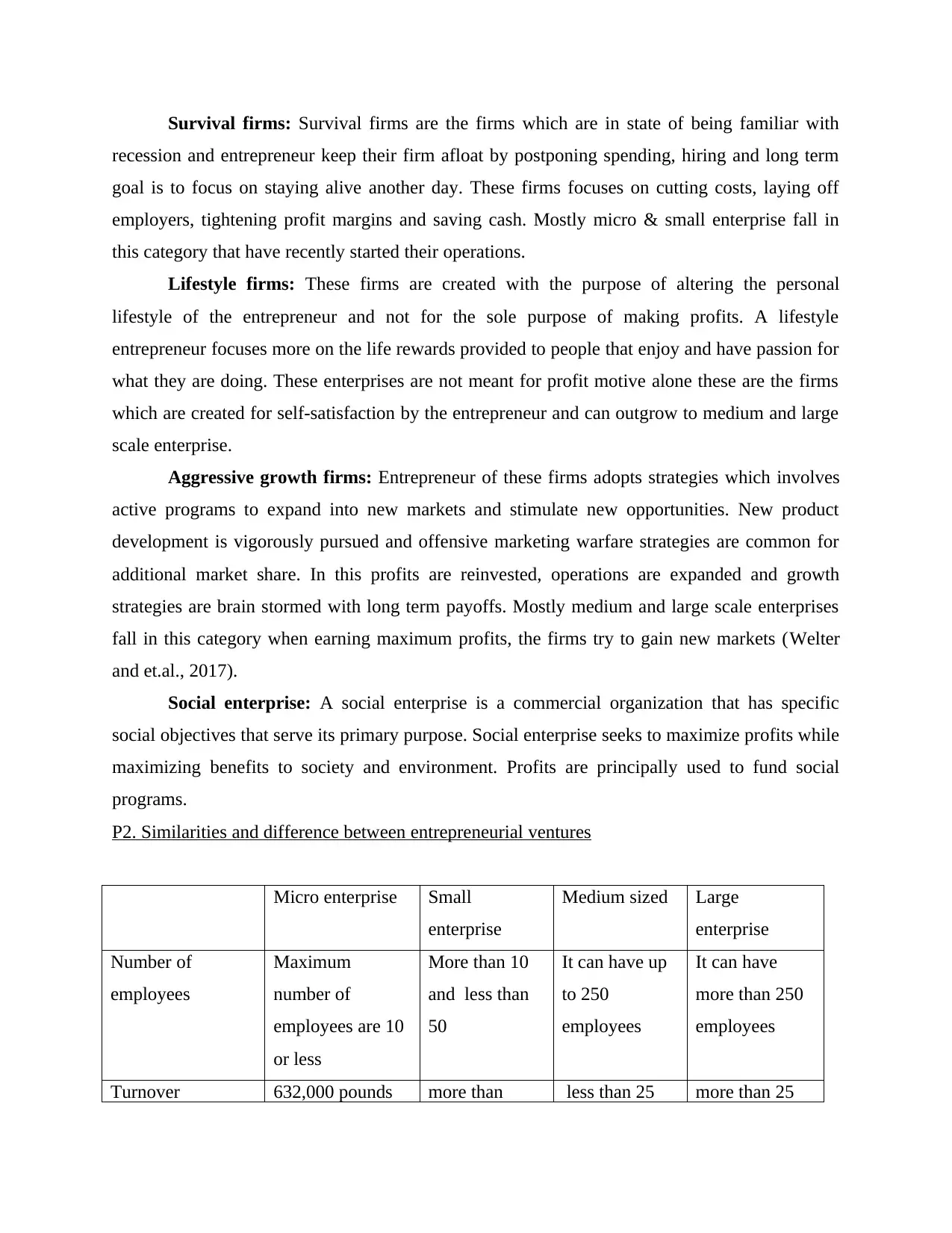
Survival firms: Survival firms are the firms which are in state of being familiar with
recession and entrepreneur keep their firm afloat by postponing spending, hiring and long term
goal is to focus on staying alive another day. These firms focuses on cutting costs, laying off
employers, tightening profit margins and saving cash. Mostly micro & small enterprise fall in
this category that have recently started their operations.
Lifestyle firms: These firms are created with the purpose of altering the personal
lifestyle of the entrepreneur and not for the sole purpose of making profits. A lifestyle
entrepreneur focuses more on the life rewards provided to people that enjoy and have passion for
what they are doing. These enterprises are not meant for profit motive alone these are the firms
which are created for self-satisfaction by the entrepreneur and can outgrow to medium and large
scale enterprise.
Aggressive growth firms: Entrepreneur of these firms adopts strategies which involves
active programs to expand into new markets and stimulate new opportunities. New product
development is vigorously pursued and offensive marketing warfare strategies are common for
additional market share. In this profits are reinvested, operations are expanded and growth
strategies are brain stormed with long term payoffs. Mostly medium and large scale enterprises
fall in this category when earning maximum profits, the firms try to gain new markets (Welter
and et.al., 2017).
Social enterprise: A social enterprise is a commercial organization that has specific
social objectives that serve its primary purpose. Social enterprise seeks to maximize profits while
maximizing benefits to society and environment. Profits are principally used to fund social
programs.
P2. Similarities and difference between entrepreneurial ventures
Micro enterprise Small
enterprise
Medium sized Large
enterprise
Number of
employees
Maximum
number of
employees are 10
or less
More than 10
and less than
50
It can have up
to 250
employees
It can have
more than 250
employees
Turnover 632,000 pounds more than less than 25 more than 25
recession and entrepreneur keep their firm afloat by postponing spending, hiring and long term
goal is to focus on staying alive another day. These firms focuses on cutting costs, laying off
employers, tightening profit margins and saving cash. Mostly micro & small enterprise fall in
this category that have recently started their operations.
Lifestyle firms: These firms are created with the purpose of altering the personal
lifestyle of the entrepreneur and not for the sole purpose of making profits. A lifestyle
entrepreneur focuses more on the life rewards provided to people that enjoy and have passion for
what they are doing. These enterprises are not meant for profit motive alone these are the firms
which are created for self-satisfaction by the entrepreneur and can outgrow to medium and large
scale enterprise.
Aggressive growth firms: Entrepreneur of these firms adopts strategies which involves
active programs to expand into new markets and stimulate new opportunities. New product
development is vigorously pursued and offensive marketing warfare strategies are common for
additional market share. In this profits are reinvested, operations are expanded and growth
strategies are brain stormed with long term payoffs. Mostly medium and large scale enterprises
fall in this category when earning maximum profits, the firms try to gain new markets (Welter
and et.al., 2017).
Social enterprise: A social enterprise is a commercial organization that has specific
social objectives that serve its primary purpose. Social enterprise seeks to maximize profits while
maximizing benefits to society and environment. Profits are principally used to fund social
programs.
P2. Similarities and difference between entrepreneurial ventures
Micro enterprise Small
enterprise
Medium sized Large
enterprise
Number of
employees
Maximum
number of
employees are 10
or less
More than 10
and less than
50
It can have up
to 250
employees
It can have
more than 250
employees
Turnover 632,000 pounds more than less than 25 more than 25
Paraphrase This Document
Need a fresh take? Get an instant paraphrase of this document with our AI Paraphraser
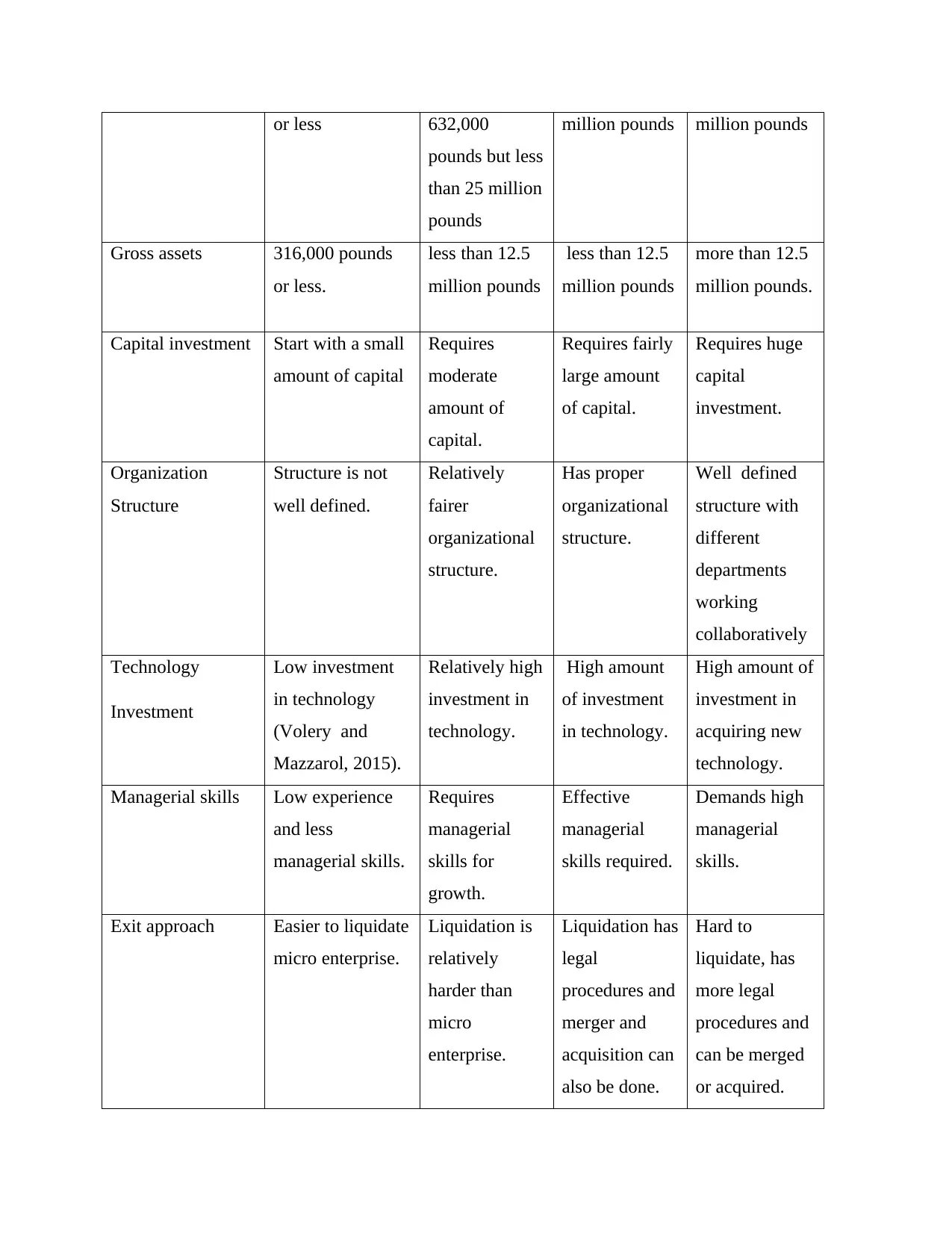
or less 632,000
pounds but less
than 25 million
pounds
million pounds million pounds
Gross assets 316,000 pounds
or less.
less than 12.5
million pounds
less than 12.5
million pounds
more than 12.5
million pounds.
Capital investment Start with a small
amount of capital
Requires
moderate
amount of
capital.
Requires fairly
large amount
of capital.
Requires huge
capital
investment.
Organization
Structure
Structure is not
well defined.
Relatively
fairer
organizational
structure.
Has proper
organizational
structure.
Well defined
structure with
different
departments
working
collaboratively
Technology
Investment
Low investment
in technology
(Volery and
Mazzarol, 2015).
Relatively high
investment in
technology.
High amount
of investment
in technology.
High amount of
investment in
acquiring new
technology.
Managerial skills Low experience
and less
managerial skills.
Requires
managerial
skills for
growth.
Effective
managerial
skills required.
Demands high
managerial
skills.
Exit approach Easier to liquidate
micro enterprise.
Liquidation is
relatively
harder than
micro
enterprise.
Liquidation has
legal
procedures and
merger and
acquisition can
also be done.
Hard to
liquidate, has
more legal
procedures and
can be merged
or acquired.
pounds but less
than 25 million
pounds
million pounds million pounds
Gross assets 316,000 pounds
or less.
less than 12.5
million pounds
less than 12.5
million pounds
more than 12.5
million pounds.
Capital investment Start with a small
amount of capital
Requires
moderate
amount of
capital.
Requires fairly
large amount
of capital.
Requires huge
capital
investment.
Organization
Structure
Structure is not
well defined.
Relatively
fairer
organizational
structure.
Has proper
organizational
structure.
Well defined
structure with
different
departments
working
collaboratively
Technology
Investment
Low investment
in technology
(Volery and
Mazzarol, 2015).
Relatively high
investment in
technology.
High amount
of investment
in technology.
High amount of
investment in
acquiring new
technology.
Managerial skills Low experience
and less
managerial skills.
Requires
managerial
skills for
growth.
Effective
managerial
skills required.
Demands high
managerial
skills.
Exit approach Easier to liquidate
micro enterprise.
Liquidation is
relatively
harder than
micro
enterprise.
Liquidation has
legal
procedures and
merger and
acquisition can
also be done.
Hard to
liquidate, has
more legal
procedures and
can be merged
or acquired.
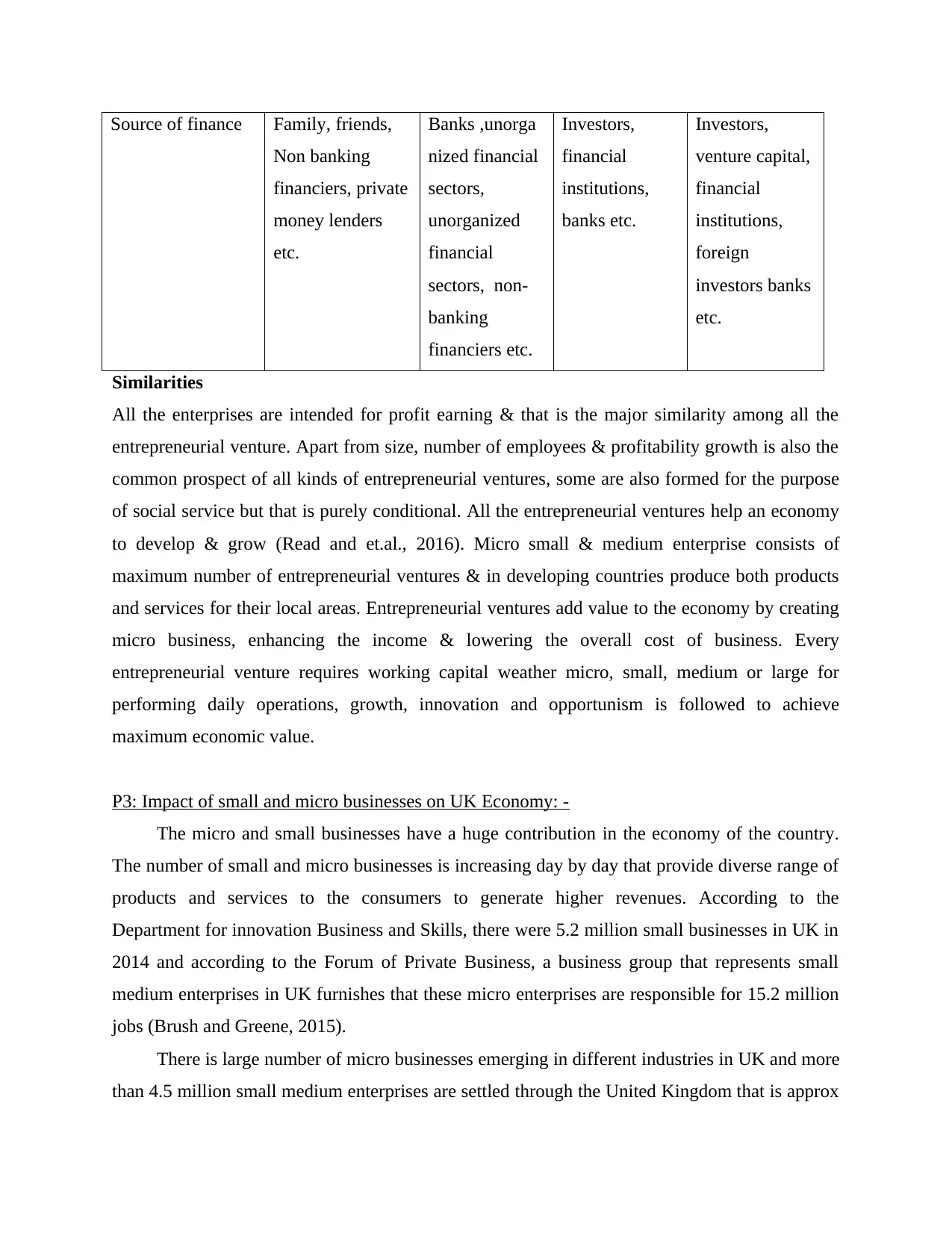
Source of finance Family, friends,
Non banking
financiers, private
money lenders
etc.
Banks ,unorga
nized financial
sectors,
unorganized
financial
sectors, non-
banking
financiers etc.
Investors,
financial
institutions,
banks etc.
Investors,
venture capital,
financial
institutions,
foreign
investors banks
etc.
Similarities
All the enterprises are intended for profit earning & that is the major similarity among all the
entrepreneurial venture. Apart from size, number of employees & profitability growth is also the
common prospect of all kinds of entrepreneurial ventures, some are also formed for the purpose
of social service but that is purely conditional. All the entrepreneurial ventures help an economy
to develop & grow (Read and et.al., 2016). Micro small & medium enterprise consists of
maximum number of entrepreneurial ventures & in developing countries produce both products
and services for their local areas. Entrepreneurial ventures add value to the economy by creating
micro business, enhancing the income & lowering the overall cost of business. Every
entrepreneurial venture requires working capital weather micro, small, medium or large for
performing daily operations, growth, innovation and opportunism is followed to achieve
maximum economic value.
P3: Impact of small and micro businesses on UK Economy: -
The micro and small businesses have a huge contribution in the economy of the country.
The number of small and micro businesses is increasing day by day that provide diverse range of
products and services to the consumers to generate higher revenues. According to the
Department for innovation Business and Skills, there were 5.2 million small businesses in UK in
2014 and according to the Forum of Private Business, a business group that represents small
medium enterprises in UK furnishes that these micro enterprises are responsible for 15.2 million
jobs (Brush and Greene, 2015).
There is large number of micro businesses emerging in different industries in UK and more
than 4.5 million small medium enterprises are settled through the United Kingdom that is approx
Non banking
financiers, private
money lenders
etc.
Banks ,unorga
nized financial
sectors,
unorganized
financial
sectors, non-
banking
financiers etc.
Investors,
financial
institutions,
banks etc.
Investors,
venture capital,
financial
institutions,
foreign
investors banks
etc.
Similarities
All the enterprises are intended for profit earning & that is the major similarity among all the
entrepreneurial venture. Apart from size, number of employees & profitability growth is also the
common prospect of all kinds of entrepreneurial ventures, some are also formed for the purpose
of social service but that is purely conditional. All the entrepreneurial ventures help an economy
to develop & grow (Read and et.al., 2016). Micro small & medium enterprise consists of
maximum number of entrepreneurial ventures & in developing countries produce both products
and services for their local areas. Entrepreneurial ventures add value to the economy by creating
micro business, enhancing the income & lowering the overall cost of business. Every
entrepreneurial venture requires working capital weather micro, small, medium or large for
performing daily operations, growth, innovation and opportunism is followed to achieve
maximum economic value.
P3: Impact of small and micro businesses on UK Economy: -
The micro and small businesses have a huge contribution in the economy of the country.
The number of small and micro businesses is increasing day by day that provide diverse range of
products and services to the consumers to generate higher revenues. According to the
Department for innovation Business and Skills, there were 5.2 million small businesses in UK in
2014 and according to the Forum of Private Business, a business group that represents small
medium enterprises in UK furnishes that these micro enterprises are responsible for 15.2 million
jobs (Brush and Greene, 2015).
There is large number of micro businesses emerging in different industries in UK and more
than 4.5 million small medium enterprises are settled through the United Kingdom that is approx
⊘ This is a preview!⊘
Do you want full access?
Subscribe today to unlock all pages.

Trusted by 1+ million students worldwide
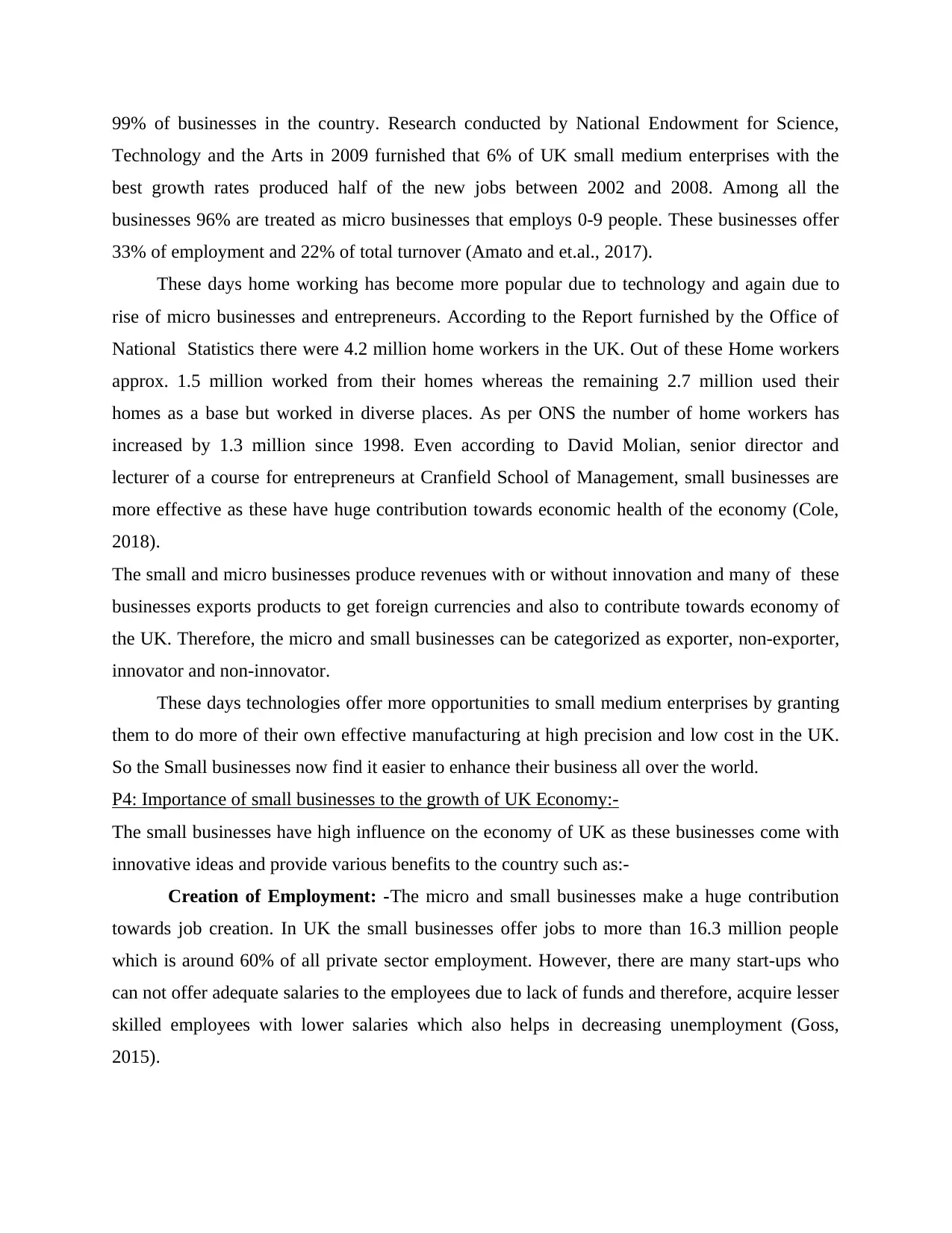
99% of businesses in the country. Research conducted by National Endowment for Science,
Technology and the Arts in 2009 furnished that 6% of UK small medium enterprises with the
best growth rates produced half of the new jobs between 2002 and 2008. Among all the
businesses 96% are treated as micro businesses that employs 0-9 people. These businesses offer
33% of employment and 22% of total turnover (Amato and et.al., 2017).
These days home working has become more popular due to technology and again due to
rise of micro businesses and entrepreneurs. According to the Report furnished by the Office of
National Statistics there were 4.2 million home workers in the UK. Out of these Home workers
approx. 1.5 million worked from their homes whereas the remaining 2.7 million used their
homes as a base but worked in diverse places. As per ONS the number of home workers has
increased by 1.3 million since 1998. Even according to David Molian, senior director and
lecturer of a course for entrepreneurs at Cranfield School of Management, small businesses are
more effective as these have huge contribution towards economic health of the economy (Cole,
2018).
The small and micro businesses produce revenues with or without innovation and many of these
businesses exports products to get foreign currencies and also to contribute towards economy of
the UK. Therefore, the micro and small businesses can be categorized as exporter, non-exporter,
innovator and non-innovator.
These days technologies offer more opportunities to small medium enterprises by granting
them to do more of their own effective manufacturing at high precision and low cost in the UK.
So the Small businesses now find it easier to enhance their business all over the world.
P4: Importance of small businesses to the growth of UK Economy:-
The small businesses have high influence on the economy of UK as these businesses come with
innovative ideas and provide various benefits to the country such as:-
Creation of Employment: -The micro and small businesses make a huge contribution
towards job creation. In UK the small businesses offer jobs to more than 16.3 million people
which is around 60% of all private sector employment. However, there are many start-ups who
can not offer adequate salaries to the employees due to lack of funds and therefore, acquire lesser
skilled employees with lower salaries which also helps in decreasing unemployment (Goss,
2015).
Technology and the Arts in 2009 furnished that 6% of UK small medium enterprises with the
best growth rates produced half of the new jobs between 2002 and 2008. Among all the
businesses 96% are treated as micro businesses that employs 0-9 people. These businesses offer
33% of employment and 22% of total turnover (Amato and et.al., 2017).
These days home working has become more popular due to technology and again due to
rise of micro businesses and entrepreneurs. According to the Report furnished by the Office of
National Statistics there were 4.2 million home workers in the UK. Out of these Home workers
approx. 1.5 million worked from their homes whereas the remaining 2.7 million used their
homes as a base but worked in diverse places. As per ONS the number of home workers has
increased by 1.3 million since 1998. Even according to David Molian, senior director and
lecturer of a course for entrepreneurs at Cranfield School of Management, small businesses are
more effective as these have huge contribution towards economic health of the economy (Cole,
2018).
The small and micro businesses produce revenues with or without innovation and many of these
businesses exports products to get foreign currencies and also to contribute towards economy of
the UK. Therefore, the micro and small businesses can be categorized as exporter, non-exporter,
innovator and non-innovator.
These days technologies offer more opportunities to small medium enterprises by granting
them to do more of their own effective manufacturing at high precision and low cost in the UK.
So the Small businesses now find it easier to enhance their business all over the world.
P4: Importance of small businesses to the growth of UK Economy:-
The small businesses have high influence on the economy of UK as these businesses come with
innovative ideas and provide various benefits to the country such as:-
Creation of Employment: -The micro and small businesses make a huge contribution
towards job creation. In UK the small businesses offer jobs to more than 16.3 million people
which is around 60% of all private sector employment. However, there are many start-ups who
can not offer adequate salaries to the employees due to lack of funds and therefore, acquire lesser
skilled employees with lower salaries which also helps in decreasing unemployment (Goss,
2015).
Paraphrase This Document
Need a fresh take? Get an instant paraphrase of this document with our AI Paraphraser
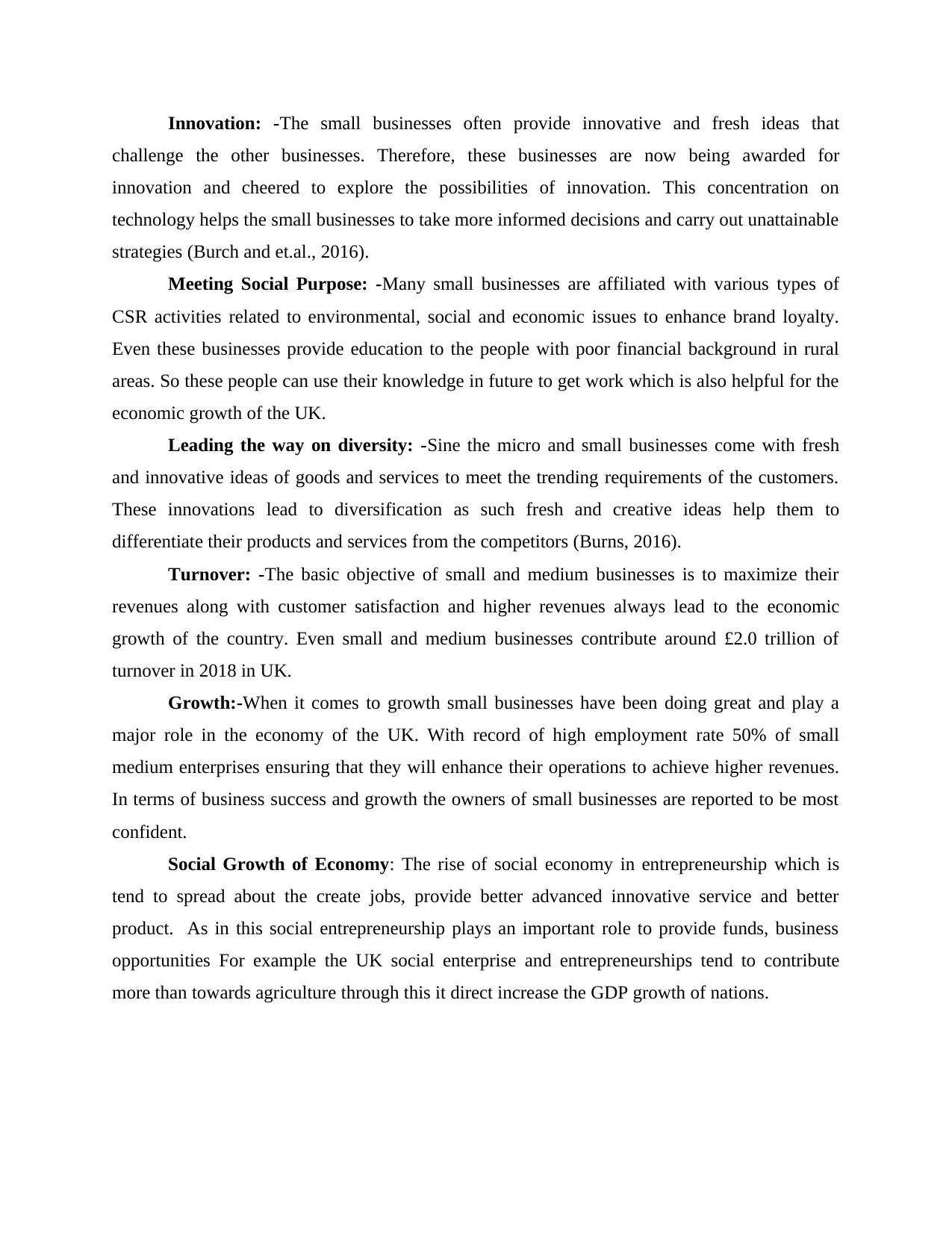
Innovation: -The small businesses often provide innovative and fresh ideas that
challenge the other businesses. Therefore, these businesses are now being awarded for
innovation and cheered to explore the possibilities of innovation. This concentration on
technology helps the small businesses to take more informed decisions and carry out unattainable
strategies (Burch and et.al., 2016).
Meeting Social Purpose: -Many small businesses are affiliated with various types of
CSR activities related to environmental, social and economic issues to enhance brand loyalty.
Even these businesses provide education to the people with poor financial background in rural
areas. So these people can use their knowledge in future to get work which is also helpful for the
economic growth of the UK.
Leading the way on diversity: -Sine the micro and small businesses come with fresh
and innovative ideas of goods and services to meet the trending requirements of the customers.
These innovations lead to diversification as such fresh and creative ideas help them to
differentiate their products and services from the competitors (Burns, 2016).
Turnover: -The basic objective of small and medium businesses is to maximize their
revenues along with customer satisfaction and higher revenues always lead to the economic
growth of the country. Even small and medium businesses contribute around £2.0 trillion of
turnover in 2018 in UK.
Growth:-When it comes to growth small businesses have been doing great and play a
major role in the economy of the UK. With record of high employment rate 50% of small
medium enterprises ensuring that they will enhance their operations to achieve higher revenues.
In terms of business success and growth the owners of small businesses are reported to be most
confident.
Social Growth of Economy: The rise of social economy in entrepreneurship which is
tend to spread about the create jobs, provide better advanced innovative service and better
product. As in this social entrepreneurship plays an important role to provide funds, business
opportunities For example the UK social enterprise and entrepreneurships tend to contribute
more than towards agriculture through this it direct increase the GDP growth of nations.
challenge the other businesses. Therefore, these businesses are now being awarded for
innovation and cheered to explore the possibilities of innovation. This concentration on
technology helps the small businesses to take more informed decisions and carry out unattainable
strategies (Burch and et.al., 2016).
Meeting Social Purpose: -Many small businesses are affiliated with various types of
CSR activities related to environmental, social and economic issues to enhance brand loyalty.
Even these businesses provide education to the people with poor financial background in rural
areas. So these people can use their knowledge in future to get work which is also helpful for the
economic growth of the UK.
Leading the way on diversity: -Sine the micro and small businesses come with fresh
and innovative ideas of goods and services to meet the trending requirements of the customers.
These innovations lead to diversification as such fresh and creative ideas help them to
differentiate their products and services from the competitors (Burns, 2016).
Turnover: -The basic objective of small and medium businesses is to maximize their
revenues along with customer satisfaction and higher revenues always lead to the economic
growth of the country. Even small and medium businesses contribute around £2.0 trillion of
turnover in 2018 in UK.
Growth:-When it comes to growth small businesses have been doing great and play a
major role in the economy of the UK. With record of high employment rate 50% of small
medium enterprises ensuring that they will enhance their operations to achieve higher revenues.
In terms of business success and growth the owners of small businesses are reported to be most
confident.
Social Growth of Economy: The rise of social economy in entrepreneurship which is
tend to spread about the create jobs, provide better advanced innovative service and better
product. As in this social entrepreneurship plays an important role to provide funds, business
opportunities For example the UK social enterprise and entrepreneurships tend to contribute
more than towards agriculture through this it direct increase the GDP growth of nations.
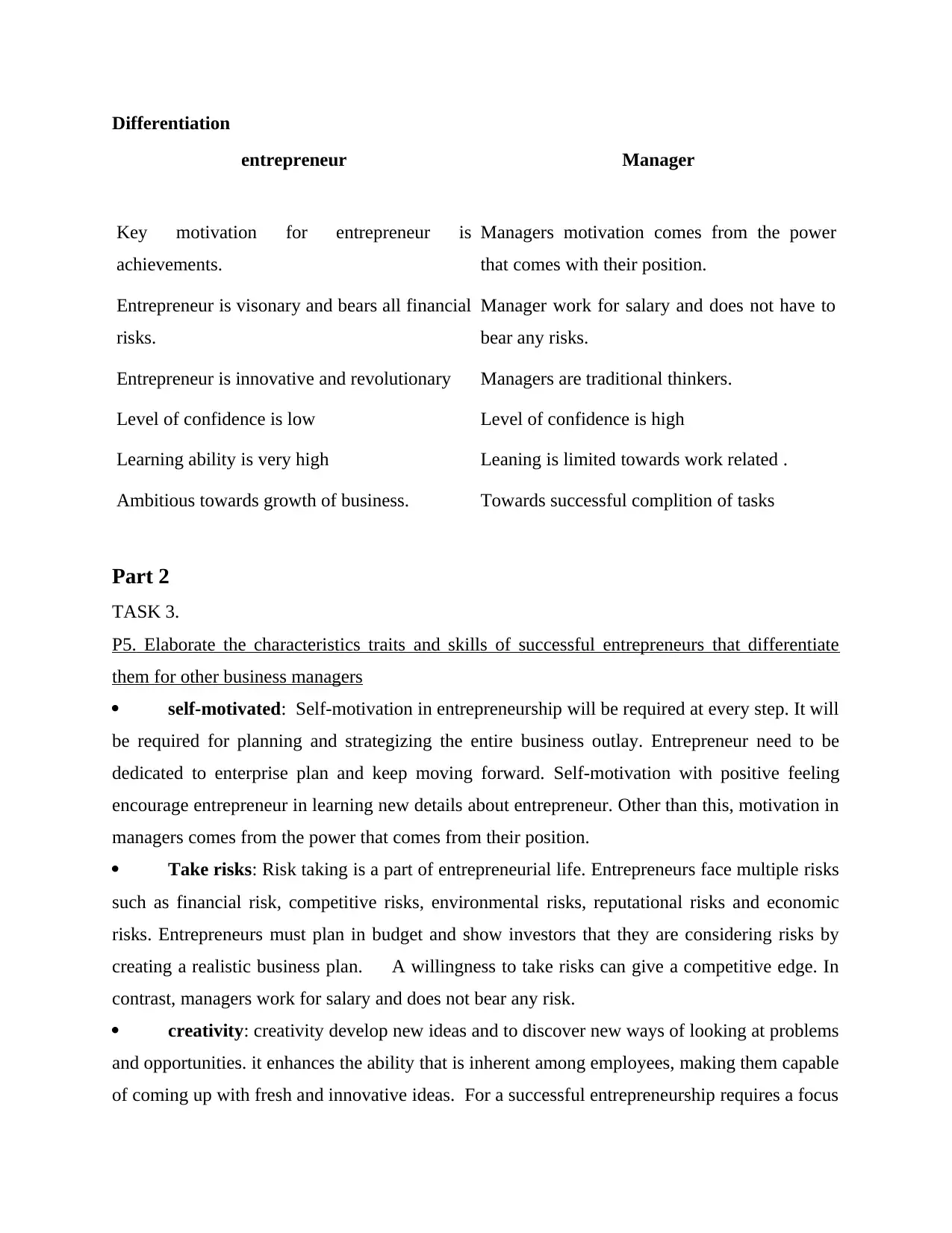
Differentiation
entrepreneur Manager
Key motivation for entrepreneur is
achievements.
Managers motivation comes from the power
that comes with their position.
Entrepreneur is visonary and bears all financial
risks.
Manager work for salary and does not have to
bear any risks.
Entrepreneur is innovative and revolutionary Managers are traditional thinkers.
Level of confidence is low Level of confidence is high
Learning ability is very high Leaning is limited towards work related .
Ambitious towards growth of business. Towards successful complition of tasks
Part 2
TASK 3.
P5. Elaborate the characteristics traits and skills of successful entrepreneurs that differentiate
them for other business managers
self-motivated: Self-motivation in entrepreneurship will be required at every step. It will
be required for planning and strategizing the entire business outlay. Entrepreneur need to be
dedicated to enterprise plan and keep moving forward. Self-motivation with positive feeling
encourage entrepreneur in learning new details about entrepreneur. Other than this, motivation in
managers comes from the power that comes from their position.
Take risks: Risk taking is a part of entrepreneurial life. Entrepreneurs face multiple risks
such as financial risk, competitive risks, environmental risks, reputational risks and economic
risks. Entrepreneurs must plan in budget and show investors that they are considering risks by
creating a realistic business plan. A willingness to take risks can give a competitive edge. In
contrast, managers work for salary and does not bear any risk.
creativity: creativity develop new ideas and to discover new ways of looking at problems
and opportunities. it enhances the ability that is inherent among employees, making them capable
of coming up with fresh and innovative ideas. For a successful entrepreneurship requires a focus
entrepreneur Manager
Key motivation for entrepreneur is
achievements.
Managers motivation comes from the power
that comes with their position.
Entrepreneur is visonary and bears all financial
risks.
Manager work for salary and does not have to
bear any risks.
Entrepreneur is innovative and revolutionary Managers are traditional thinkers.
Level of confidence is low Level of confidence is high
Learning ability is very high Leaning is limited towards work related .
Ambitious towards growth of business. Towards successful complition of tasks
Part 2
TASK 3.
P5. Elaborate the characteristics traits and skills of successful entrepreneurs that differentiate
them for other business managers
self-motivated: Self-motivation in entrepreneurship will be required at every step. It will
be required for planning and strategizing the entire business outlay. Entrepreneur need to be
dedicated to enterprise plan and keep moving forward. Self-motivation with positive feeling
encourage entrepreneur in learning new details about entrepreneur. Other than this, motivation in
managers comes from the power that comes from their position.
Take risks: Risk taking is a part of entrepreneurial life. Entrepreneurs face multiple risks
such as financial risk, competitive risks, environmental risks, reputational risks and economic
risks. Entrepreneurs must plan in budget and show investors that they are considering risks by
creating a realistic business plan. A willingness to take risks can give a competitive edge. In
contrast, managers work for salary and does not bear any risk.
creativity: creativity develop new ideas and to discover new ways of looking at problems
and opportunities. it enhances the ability that is inherent among employees, making them capable
of coming up with fresh and innovative ideas. For a successful entrepreneurship requires a focus
⊘ This is a preview!⊘
Do you want full access?
Subscribe today to unlock all pages.

Trusted by 1+ million students worldwide
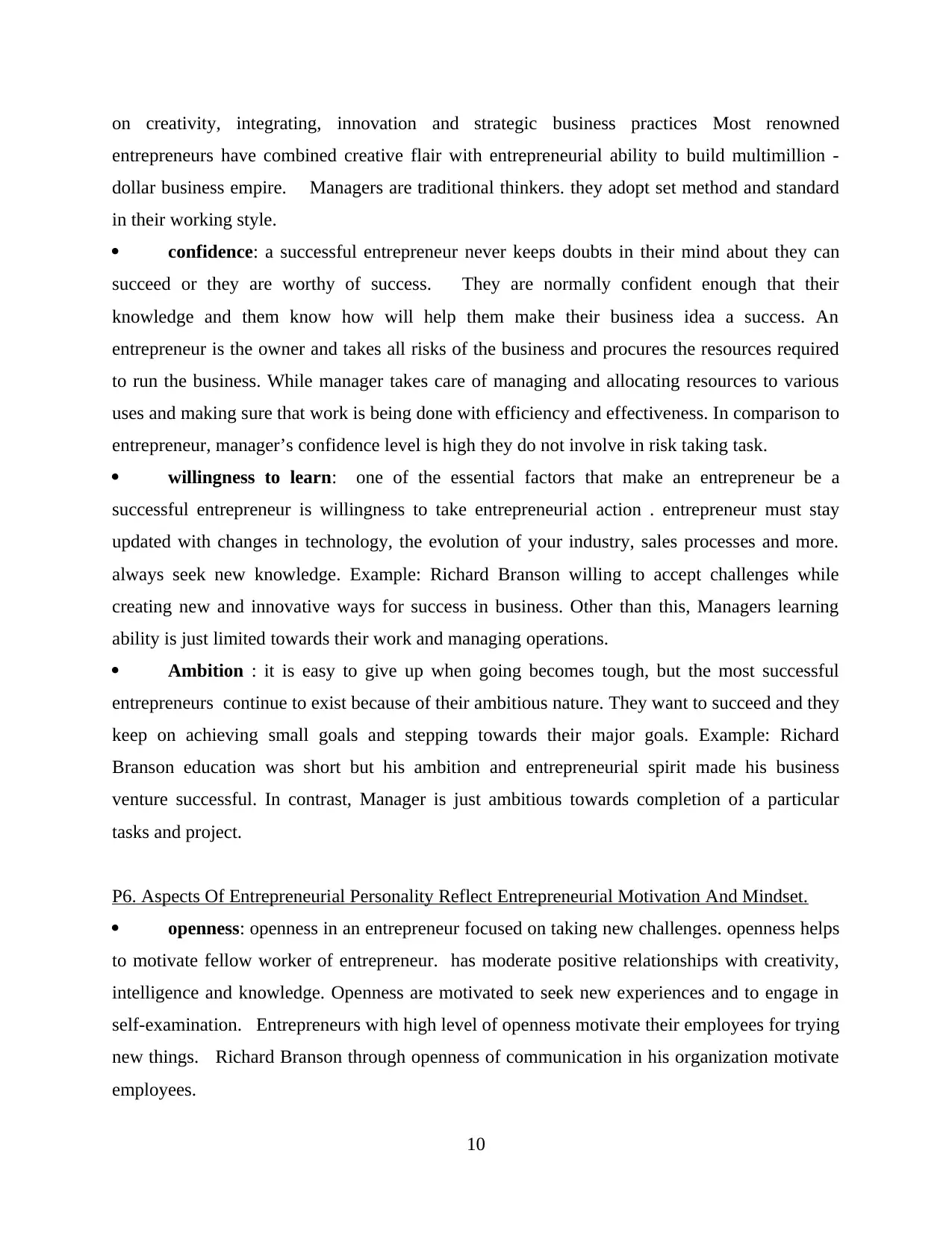
on creativity, integrating, innovation and strategic business practices Most renowned
entrepreneurs have combined creative flair with entrepreneurial ability to build multimillion -
dollar business empire. Managers are traditional thinkers. they adopt set method and standard
in their working style.
confidence: a successful entrepreneur never keeps doubts in their mind about they can
succeed or they are worthy of success. They are normally confident enough that their
knowledge and them know how will help them make their business idea a success. An
entrepreneur is the owner and takes all risks of the business and procures the resources required
to run the business. While manager takes care of managing and allocating resources to various
uses and making sure that work is being done with efficiency and effectiveness. In comparison to
entrepreneur, manager’s confidence level is high they do not involve in risk taking task.
willingness to learn: one of the essential factors that make an entrepreneur be a
successful entrepreneur is willingness to take entrepreneurial action . entrepreneur must stay
updated with changes in technology, the evolution of your industry, sales processes and more.
always seek new knowledge. Example: Richard Branson willing to accept challenges while
creating new and innovative ways for success in business. Other than this, Managers learning
ability is just limited towards their work and managing operations.
Ambition : it is easy to give up when going becomes tough, but the most successful
entrepreneurs continue to exist because of their ambitious nature. They want to succeed and they
keep on achieving small goals and stepping towards their major goals. Example: Richard
Branson education was short but his ambition and entrepreneurial spirit made his business
venture successful. In contrast, Manager is just ambitious towards completion of a particular
tasks and project.
P6. Aspects Of Entrepreneurial Personality Reflect Entrepreneurial Motivation And Mindset.
openness: openness in an entrepreneur focused on taking new challenges. openness helps
to motivate fellow worker of entrepreneur. has moderate positive relationships with creativity,
intelligence and knowledge. Openness are motivated to seek new experiences and to engage in
self-examination. Entrepreneurs with high level of openness motivate their employees for trying
new things. Richard Branson through openness of communication in his organization motivate
employees.
10
entrepreneurs have combined creative flair with entrepreneurial ability to build multimillion -
dollar business empire. Managers are traditional thinkers. they adopt set method and standard
in their working style.
confidence: a successful entrepreneur never keeps doubts in their mind about they can
succeed or they are worthy of success. They are normally confident enough that their
knowledge and them know how will help them make their business idea a success. An
entrepreneur is the owner and takes all risks of the business and procures the resources required
to run the business. While manager takes care of managing and allocating resources to various
uses and making sure that work is being done with efficiency and effectiveness. In comparison to
entrepreneur, manager’s confidence level is high they do not involve in risk taking task.
willingness to learn: one of the essential factors that make an entrepreneur be a
successful entrepreneur is willingness to take entrepreneurial action . entrepreneur must stay
updated with changes in technology, the evolution of your industry, sales processes and more.
always seek new knowledge. Example: Richard Branson willing to accept challenges while
creating new and innovative ways for success in business. Other than this, Managers learning
ability is just limited towards their work and managing operations.
Ambition : it is easy to give up when going becomes tough, but the most successful
entrepreneurs continue to exist because of their ambitious nature. They want to succeed and they
keep on achieving small goals and stepping towards their major goals. Example: Richard
Branson education was short but his ambition and entrepreneurial spirit made his business
venture successful. In contrast, Manager is just ambitious towards completion of a particular
tasks and project.
P6. Aspects Of Entrepreneurial Personality Reflect Entrepreneurial Motivation And Mindset.
openness: openness in an entrepreneur focused on taking new challenges. openness helps
to motivate fellow worker of entrepreneur. has moderate positive relationships with creativity,
intelligence and knowledge. Openness are motivated to seek new experiences and to engage in
self-examination. Entrepreneurs with high level of openness motivate their employees for trying
new things. Richard Branson through openness of communication in his organization motivate
employees.
10
Paraphrase This Document
Need a fresh take? Get an instant paraphrase of this document with our AI Paraphraser
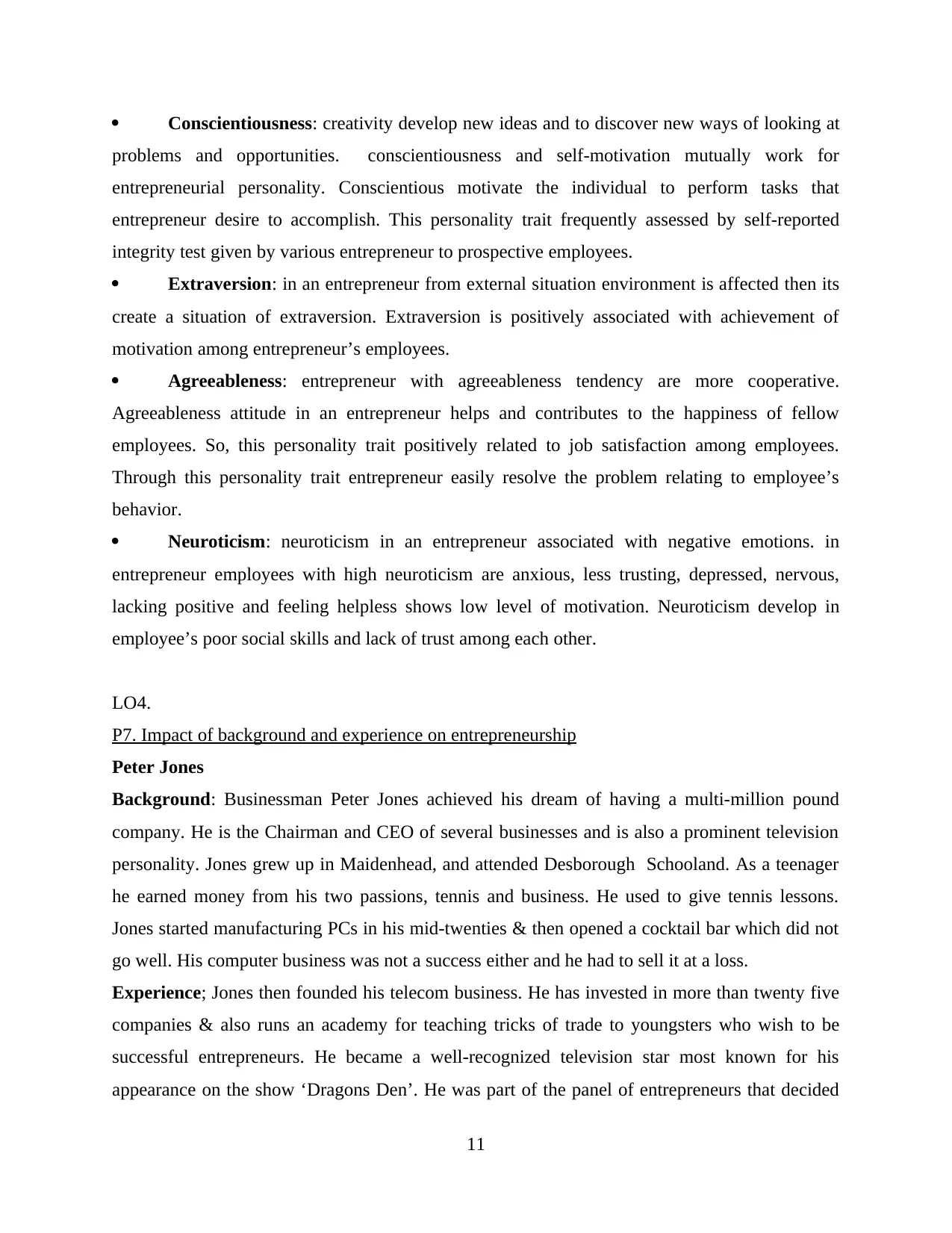
Conscientiousness: creativity develop new ideas and to discover new ways of looking at
problems and opportunities. conscientiousness and self-motivation mutually work for
entrepreneurial personality. Conscientious motivate the individual to perform tasks that
entrepreneur desire to accomplish. This personality trait frequently assessed by self-reported
integrity test given by various entrepreneur to prospective employees.
Extraversion: in an entrepreneur from external situation environment is affected then its
create a situation of extraversion. Extraversion is positively associated with achievement of
motivation among entrepreneur’s employees.
Agreeableness: entrepreneur with agreeableness tendency are more cooperative.
Agreeableness attitude in an entrepreneur helps and contributes to the happiness of fellow
employees. So, this personality trait positively related to job satisfaction among employees.
Through this personality trait entrepreneur easily resolve the problem relating to employee’s
behavior.
Neuroticism: neuroticism in an entrepreneur associated with negative emotions. in
entrepreneur employees with high neuroticism are anxious, less trusting, depressed, nervous,
lacking positive and feeling helpless shows low level of motivation. Neuroticism develop in
employee’s poor social skills and lack of trust among each other.
LO4.
P7. Impact of background and experience on entrepreneurship
Peter Jones
Background: Businessman Peter Jones achieved his dream of having a multi-million pound
company. He is the Chairman and CEO of several businesses and is also a prominent television
personality. Jones grew up in Maidenhead, and attended Desborough Schooland. As a teenager
he earned money from his two passions, tennis and business. He used to give tennis lessons.
Jones started manufacturing PCs in his mid-twenties & then opened a cocktail bar which did not
go well. His computer business was not a success either and he had to sell it at a loss.
Experience; Jones then founded his telecom business. He has invested in more than twenty five
companies & also runs an academy for teaching tricks of trade to youngsters who wish to be
successful entrepreneurs. He became a well-recognized television star most known for his
appearance on the show ‘Dragons Den’. He was part of the panel of entrepreneurs that decided
11
problems and opportunities. conscientiousness and self-motivation mutually work for
entrepreneurial personality. Conscientious motivate the individual to perform tasks that
entrepreneur desire to accomplish. This personality trait frequently assessed by self-reported
integrity test given by various entrepreneur to prospective employees.
Extraversion: in an entrepreneur from external situation environment is affected then its
create a situation of extraversion. Extraversion is positively associated with achievement of
motivation among entrepreneur’s employees.
Agreeableness: entrepreneur with agreeableness tendency are more cooperative.
Agreeableness attitude in an entrepreneur helps and contributes to the happiness of fellow
employees. So, this personality trait positively related to job satisfaction among employees.
Through this personality trait entrepreneur easily resolve the problem relating to employee’s
behavior.
Neuroticism: neuroticism in an entrepreneur associated with negative emotions. in
entrepreneur employees with high neuroticism are anxious, less trusting, depressed, nervous,
lacking positive and feeling helpless shows low level of motivation. Neuroticism develop in
employee’s poor social skills and lack of trust among each other.
LO4.
P7. Impact of background and experience on entrepreneurship
Peter Jones
Background: Businessman Peter Jones achieved his dream of having a multi-million pound
company. He is the Chairman and CEO of several businesses and is also a prominent television
personality. Jones grew up in Maidenhead, and attended Desborough Schooland. As a teenager
he earned money from his two passions, tennis and business. He used to give tennis lessons.
Jones started manufacturing PCs in his mid-twenties & then opened a cocktail bar which did not
go well. His computer business was not a success either and he had to sell it at a loss.
Experience; Jones then founded his telecom business. He has invested in more than twenty five
companies & also runs an academy for teaching tricks of trade to youngsters who wish to be
successful entrepreneurs. He became a well-recognized television star most known for his
appearance on the show ‘Dragons Den’. He was part of the panel of entrepreneurs that decided
11
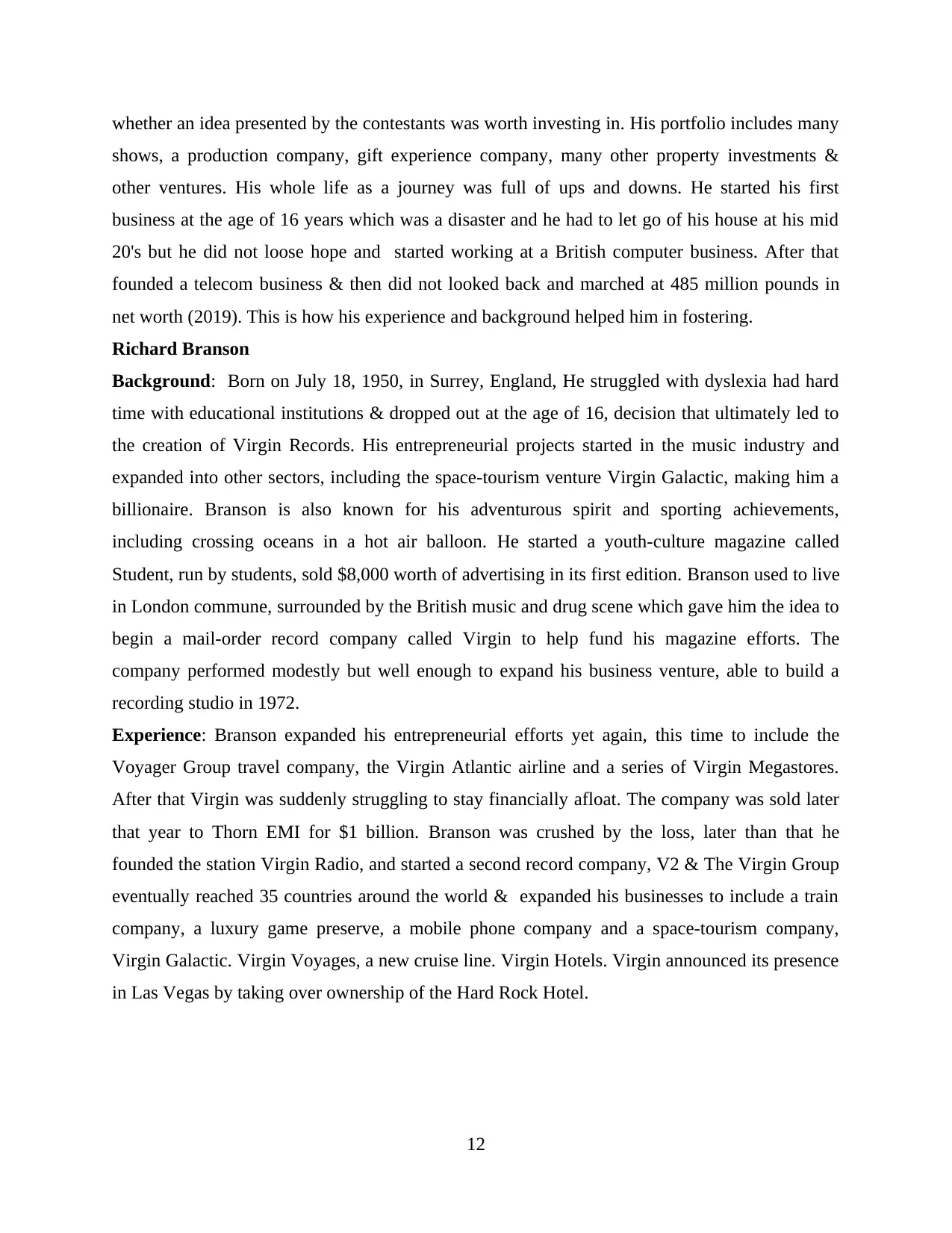
whether an idea presented by the contestants was worth investing in. His portfolio includes many
shows, a production company, gift experience company, many other property investments &
other ventures. His whole life as a journey was full of ups and downs. He started his first
business at the age of 16 years which was a disaster and he had to let go of his house at his mid
20's but he did not loose hope and started working at a British computer business. After that
founded a telecom business & then did not looked back and marched at 485 million pounds in
net worth (2019). This is how his experience and background helped him in fostering.
Richard Branson
Background: Born on July 18, 1950, in Surrey, England, He struggled with dyslexia had hard
time with educational institutions & dropped out at the age of 16, decision that ultimately led to
the creation of Virgin Records. His entrepreneurial projects started in the music industry and
expanded into other sectors, including the space-tourism venture Virgin Galactic, making him a
billionaire. Branson is also known for his adventurous spirit and sporting achievements,
including crossing oceans in a hot air balloon. He started a youth-culture magazine called
Student, run by students, sold $8,000 worth of advertising in its first edition. Branson used to live
in London commune, surrounded by the British music and drug scene which gave him the idea to
begin a mail-order record company called Virgin to help fund his magazine efforts. The
company performed modestly but well enough to expand his business venture, able to build a
recording studio in 1972.
Experience: Branson expanded his entrepreneurial efforts yet again, this time to include the
Voyager Group travel company, the Virgin Atlantic airline and a series of Virgin Megastores.
After that Virgin was suddenly struggling to stay financially afloat. The company was sold later
that year to Thorn EMI for $1 billion. Branson was crushed by the loss, later than that he
founded the station Virgin Radio, and started a second record company, V2 & The Virgin Group
eventually reached 35 countries around the world & expanded his businesses to include a train
company, a luxury game preserve, a mobile phone company and a space-tourism company,
Virgin Galactic. Virgin Voyages, a new cruise line. Virgin Hotels. Virgin announced its presence
in Las Vegas by taking over ownership of the Hard Rock Hotel.
12
shows, a production company, gift experience company, many other property investments &
other ventures. His whole life as a journey was full of ups and downs. He started his first
business at the age of 16 years which was a disaster and he had to let go of his house at his mid
20's but he did not loose hope and started working at a British computer business. After that
founded a telecom business & then did not looked back and marched at 485 million pounds in
net worth (2019). This is how his experience and background helped him in fostering.
Richard Branson
Background: Born on July 18, 1950, in Surrey, England, He struggled with dyslexia had hard
time with educational institutions & dropped out at the age of 16, decision that ultimately led to
the creation of Virgin Records. His entrepreneurial projects started in the music industry and
expanded into other sectors, including the space-tourism venture Virgin Galactic, making him a
billionaire. Branson is also known for his adventurous spirit and sporting achievements,
including crossing oceans in a hot air balloon. He started a youth-culture magazine called
Student, run by students, sold $8,000 worth of advertising in its first edition. Branson used to live
in London commune, surrounded by the British music and drug scene which gave him the idea to
begin a mail-order record company called Virgin to help fund his magazine efforts. The
company performed modestly but well enough to expand his business venture, able to build a
recording studio in 1972.
Experience: Branson expanded his entrepreneurial efforts yet again, this time to include the
Voyager Group travel company, the Virgin Atlantic airline and a series of Virgin Megastores.
After that Virgin was suddenly struggling to stay financially afloat. The company was sold later
that year to Thorn EMI for $1 billion. Branson was crushed by the loss, later than that he
founded the station Virgin Radio, and started a second record company, V2 & The Virgin Group
eventually reached 35 countries around the world & expanded his businesses to include a train
company, a luxury game preserve, a mobile phone company and a space-tourism company,
Virgin Galactic. Virgin Voyages, a new cruise line. Virgin Hotels. Virgin announced its presence
in Las Vegas by taking over ownership of the Hard Rock Hotel.
12
⊘ This is a preview!⊘
Do you want full access?
Subscribe today to unlock all pages.

Trusted by 1+ million students worldwide
1 out of 16
Related Documents
Your All-in-One AI-Powered Toolkit for Academic Success.
+13062052269
info@desklib.com
Available 24*7 on WhatsApp / Email
![[object Object]](/_next/static/media/star-bottom.7253800d.svg)
Unlock your academic potential
Copyright © 2020–2026 A2Z Services. All Rights Reserved. Developed and managed by ZUCOL.





